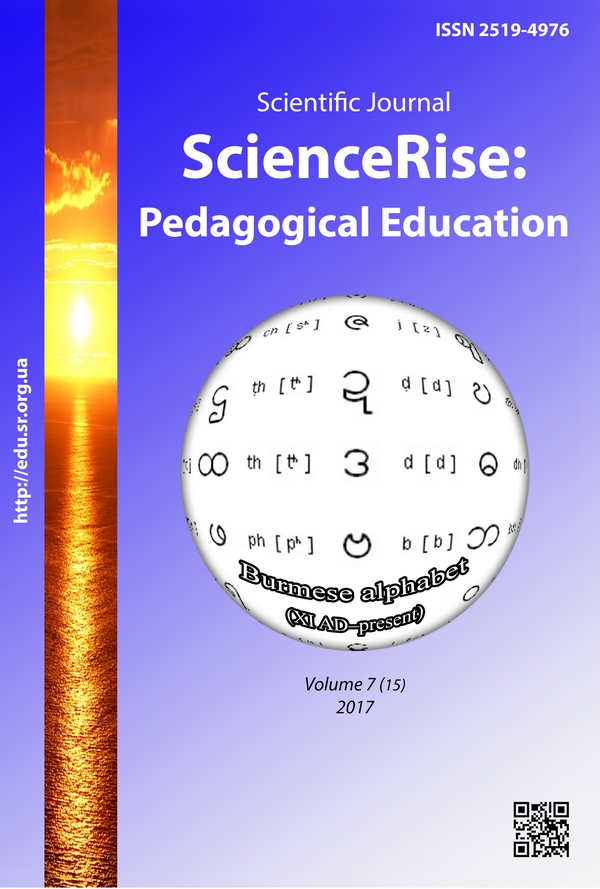Теоретико-методологічні основи використання дистанційного навчання вчителів у системі післядипломної педагогічної освіти
DOI:
https://doi.org/10.15587/2519-4984.2017.107538Ключові слова:
післядипломна освіта вчителів, організація дистанційного навчання, теоретичні та методологічні підходиАнотація
У дослідженні проаналізовано теоретичні та методологічні аспекти використання дистанційної форми навчання у системі післядипломної педагогічної освіти. Спираючись на аналіз наукових джерел, світовий та вітчизняний досвід впровадження дистанційного навчання, виділено базові визначення дистанційного навчання, сформульовано сучасне поняття дистанційного навчання у системі післядипломної педагогічної освіти
Посилання
- Bykov, V. Yu. (2012). Innovative development of means and technologies of open education systems. Modern information technologies and innovative methods in preparation of specialists: methodology, theory, experience, problems, 29, 32–40.
- Oliynyk, V. V. (2013). Open postgraduate pedagogical education and distance learning in questions and answers. Kyiv: A.S.K., 312.
- Kremin, V. G., Ilyin, V. V. (2012). Synergetics in Education: The Context of Man-Centerism. Kyiv: Pedagogical Thought, 366.
- Sharan, R. V. (2012). Leading Trends in the Development of Distance Education in Ukraine. Collection of scientific works of the Khmelnytsky Institute of Social Technologies of the University of Ukraine, 5, 220–224.
- Polat, E. S., Petrov, A. E. Remote training how to be it? Available at: http://distant.ioso.ru/library/publication/artped.htm
- Kukharenko, V. N. (2012). Educational process in the mass open distance course. Theory and practice of social systems management: philosophy, psychology, pedagogy, sociology: quarterly sciences, 1, 40–50.
- Shunevich, B. I. (2008). Development of distance learning in a high school in the countries of Europe and North America. Kyiv, 38.
- Polat, E. S., Buhankina, M. Yu., Moiseeva, M. V. (2004). The theory and practice of distance learning. Moscow: Akademiya, 416.
- Berberoglu, N., Berberoglu, B. (2015). Grouping the Mega University Countries According to their Similarities. Procedia – Social and Behavioral Sciences, 174, 2153–2159. doi: 10.1016/j.sbspro.2015.02.015
- Peters, O. (2001). Learning and Teaching in Distance EducationB: Analyses and Interpreta- tions from an International Perspective. London: Kogan Page, 280.
- Holmberg, B. (1995). Theory and practice of distance education. London-New York: Routledge.
- Baath, J. (1982). Distance students’ learning – empirical findings and theoretical deliberations. Distance Education, 3 (1), 6–27. doi: 10.1080/0158791820030102
- Daniel, J. S. (1996). Mega-Universities and Knowledge Media: Technology Strategies for Higher Education. London: Kogan Page, 212. doi: 10.4324/9780203045978
- Holmberg, B. (2007). A Theory of Teaching-Learning Conversations. Hand- book of Distance Education. New York: Routledge, 69–75.
- Moore, M. G. (1991). Editorial: Distance education theory. American Journal of Distance Education, 5 (3), 1–6. doi: 10.1080/08923649109526758
- Moore, M. G., Kearsley, G. (2012). Distance Education: A Systems View. Belmont: Wadsworth, 384.
- Moore, M. G. (Ed.) (2007). The Theory of Transactional Distance. The Handbook of Distance Education. New Jersey: Lawrence Erlbaum Associates, 89–108.
- Saba, F., Shearer, R. (2017). The Theory of Transactional Distance: Principles, Methods, and Applications in Higher Education. New York: Routledge.
- Swart, W. (2017). Extending the Principles of Flipped Learning to Achieve Measurable Results: Emerging Research and Opportunities. Hershey: IGI Global.
- Garrison, R. (2000). Theoretical Challenges for Distance Education in the 21st Century: A Shift from Structural to Transactional Issues. The International Review of Research in Open and Distributed Learning, 1 (1). doi: 10.19173/irrodl.v1i1.2
- Saba, F.; Moore, M. G., Anderson, W. G. (Eds.) (2003). Distance education theory, methodology and epistemology: A pragmatic paradigm. Handbook of Distance Education. Mahwah: Lawrence Erlbaum Associates.
- Birochi, R., Pozzebon, M. (2011). Theorizing in Distance Education: The Critical Quest for Conceptual Foundations. Journal of Online Learning and Teaching, 7 (4). Available at: http://gvpesquisa.fgv.br/sites/gvpesquisa.fgv.br/files/arquivos/pozzebon_-_theorizing_in_distance_education_the_critical_quest_for_conceptual_foundations.ppd
##submission.downloads##
Опубліковано
Як цитувати
Номер
Розділ
Ліцензія
Авторське право (c) 2017 Ganna Kashina

Ця робота ліцензується відповідно до Creative Commons Attribution 4.0 International License.
Наше видання використовує положення про авторські права Creative Commons CC BY для журналів відкритого доступу.
Автори, які публікуються у цьому журналі, погоджуються з наступними умовами:
1. Автори залишають за собою право на авторство своєї роботи та передають журналу право першої публікації цієї роботи на умовах ліцензії Creative Commons CC BY, котра дозволяє іншим особам вільно розповсюджувати опубліковану роботу з обов'язковим посиланням на авторів оригінальної роботи та першу публікацію роботи у цьому журналі.
2. Автори мають право укладати самостійні додаткові угоди щодо неексклюзивного розповсюдження роботи у тому вигляді, в якому вона була опублікована цим журналом (наприклад, розміщувати роботу в електронному сховищі установи або публікувати у складі монографії), за умови збереження посилання на першу публікацію роботи у цьому журналі.









